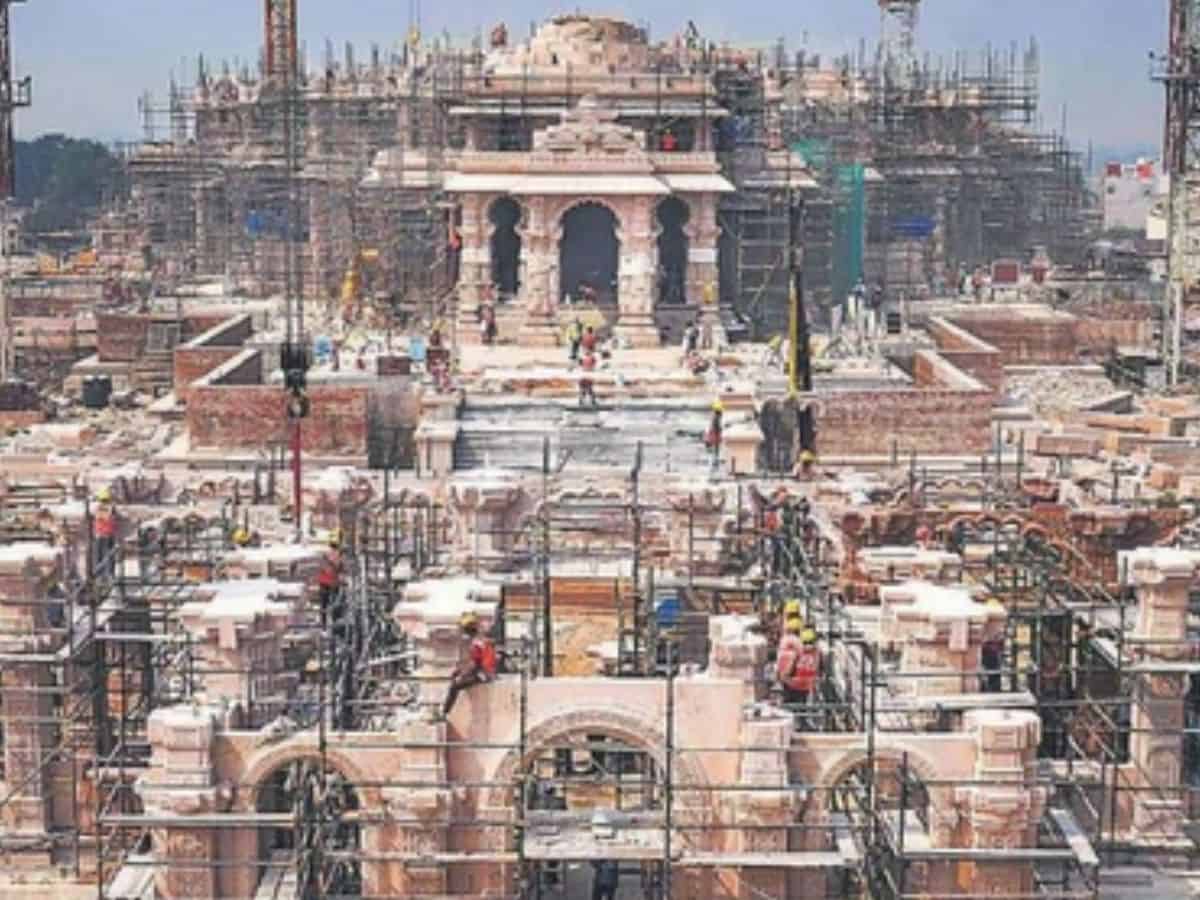
Ayodhya: Most of the Ram temple compound here will be a green area with hundreds of trees and the complex itself will be “atmanirbhar”, the trust said underlining features like its own sewage and water treatment plants, a fire brigade post and a dedicated power line.
About 70 per cent of the 70-acre complex will be a green area, Ram temple trust general secretary Champat Rai told reporters here on Tuesday.
“The green area includes portions which are very dense, and in some segments of it, even sunlight hardly filters through,” he said. About 600 existing trees are preserved in the green belt.
In a presentation to the media, Rai said the temple complex will be “atmanirbhar’ (self-reliant) in its own way, and will not put any burden on the Ayodhya municipal body’s sewage or drainage system.
The complex will have two STPs (sewage treatment plants, one WTP (water treatment plant) and a dedicated electricity line from the power house. A fire brigade post there will be able to source water from an underground reservoir, he said.
The first phase of the temple is nearing completion, and Prime Minister Narendra Modi will take part in the “pran pratishtha,” or the consecration ceremony of the Ram Lalla idol, on January 22.
Uttar Pradesh Deputy Chief Minister Keshav Prasad Maurya visited the office of the Shri Ram Janmabhoomi Teerth Kshetra, located at Ramkot in Ayodhya.
Modi will also visit the temple town on December 30 to inaugurate the redeveloped Ayodhya railway station and a new airport. He will also address a rally, officials said earlier.
“Preparations are in full swing for his visit. We are all geared up,” Maurya told PTI.
A panoramic image of the upcoming temple, as envisaged, is displayed in the lobby of the trust’s office. Rai accompanied journalists to the temple construction site after a presentation of Ram Mandir landscape plan.
“The entry into the temple will be from the east side, and exit from the south side. The entire temple superstructure will eventually be three storeys — G+2,” he said.
Visitors will climb 32 steps from the eastern side to reach the main temple.
The temple complex, built in the traditional Nagara style, will be 380 feet long (east-west direction), 250 feet wide and 161 feet high, he said.
Each floor of the temple will be 20 ft high and have a total of 392 pillars and 44 gates, he added.
The grand temple will have a rectangular periphery called ‘percota’, a feature that is found in temples in South India, but generally not in the north, he said.
The ‘percota’ will be 14-foot wide and this periphery will span 732 metres, Rai said.
The four corners of the ‘percota’ will be dedicated to Sun God, Maa Bhagwati, Lord Ganesha and Lord Shiva.
A shrine dedicated to Maa Annapurna will be constructed on the northern side. On the southern side, there will be shrine for Lord Hanuman, Rai said.
Seven other shrines are planned in the complex, dedicated to Maharshi Valmiki, Maharshi Vashisht, Maharshi Vishwamitra, Maharshi Agastya, Nishad Raj, Mata Shabri and Devi Ahilya — all associated with Lord Ram’s life.
And an idol of Jatayu has been installed at Ayodhya’s Kuber Tila. “An ancient Shiva temple that exists on Kuber Tila has also been revitalised,” Rai said.
On Tuesday, when PTI visited the construction site, labourers were busy chiselling stone slabs, giving finishes touches ahead of the consecration ceremony.
The auspicious time for the consecration, according to Rai, would be between noon and 12.15 pm.
On Tuesday, a large number of people visited the Ram Janmabhoomi site to have a ‘darshan’ of the deity the old idol of Ram Lalla that is housed in a makeshift shrine — as construction activity continued nearby.
The complex will also have a lift and two ramps at the entrance for the elderly and people with disabilities.
There will be a pilgrim facilitation complex with a healthcare centre and a toilet block. Before their darshan’, 25,000 people will be able to deposit their shoes, watches and mobile phones.
A pathway has been built for emergency situations.
Rai said that a statue of Jatayu has been installed at Kuber Tila in Ayodhya, and an ancient Shiva temple already there has been revitalised,” he added.
The Supreme Court delivered a historic verdict in 2019, settling a temple-mosque dispute that went over a century back.
The court backed the construction of the Ram temple at the disputed site, and ruled that an alternative five-acre plot must be found for building a mosque.
